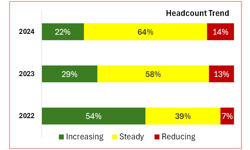When an industry like publishing, which is in the midst of a crisis of confidence, is struck amidships by a relatively rampant industry like technology, it's all too often the cue for a frantic bout of directionless activity. This saddles the publisher with an increased cost base while benefiting nobody but the tech firms.
It happened more than ten years ago when publishing companies threw insane sums of money in the direction of consultants who panicked them into thinking there was something called First Mover Advantage and that anyone who didn't build some proprietary kit would be left at the starting gate while everybody else was making a fortune in the new web order.
Beware the hype
Here we go again, waiting with that familiar mixture of hope and trepidation to see what, if anything, the iPad and the Kindle are going to mean to us. Undoubtedly newness has a force all of its own and in the case of a company as smart as Apple, there's a danger that we can get drunk on their hype, most of which they rely on us to generate. In order to avoid further contributing to it with articles like this one, we should at least ensure that we aren't rushing towards answers before people have decided what the questions are.
There's no doubt that these various reading and browsing devices will become part of our lives to some extent. Whether they eventually become as ubiquitous as the iPod or as fleeting and marginal as the Palm Pilot will depend on lots of tiny but crucial economic details and the extent to which they capture the imagination and fulfil the needs of the public. We should remember that certain truths are not self-evident.
Migration to eReaders not inevitable
First of all, it is not the case, as some people seem to be assuming, that magazines and newspapers, will inevitably migrate on to screens. The circulation declines of the last ten years have not happened because readers are sitting around drumming their fingers waiting for their favourite title to be available on a screen. They've happened because people have lots of other ways to occupy the traditional downtime that magazines once monopolised. Many of these other ways involve screens. The decline of the recorded music business, which the publishing business is trying to avoid repeating, came about as much from the rise of the computer games business as from the effects of file sharing.
Secondly, don't believe the demos. What you're seeing at the moment in all these whizzy demonstrations of iPad content for magazines like Sports Illustrated has about as much to do with what will actually happen as those artists’ depictions of the future that used to be so popular in the 50s. They're designed to impress advertisers and Wall Street analysts, neither of whom have a good track record when it comes to predicting actual reader behaviour. All these sleek renditions of users’ fingers stroking feature pages into life (it's always feature pages, note) are aimed at people who are inclined to think navigation is an end in itself. It isn't.
Motion sickness
Thirdly, motion isn't magic. If the pinnacle of our hopes for the on-screen magazine is that it enables us to enhance the odd feature with the odd moving picture then we may as well forget about it right now. For a start the kind of fancy visuals that feature in demos would consume the entire monthly editorial budget of most magazines. Which brings me to the fourth point.
Beware the costs. If our experience of the internet in the last ten years teaches one thing, it's that cheap and cheerful beats expensive and polished most days of the week. One of the core skills of magazine publishers is being able to develop formats that can be affordably repeated. Once you stray into moving pictures and copyright music, you're into a different model altogether. If there's anything my friends in TV envy about magazines, it's the medium's cheapness and flexibility. There's no point trading that in for a whole new set of problems, which is what we'll be doing if we start adopting TV's production values in our effort to make everything move. Instead of spending money on enhancements in the unproven belief that they will prove attractive to people who are currently getting along without us, we should be thinking how we can use this technology to provide better services for and thereby make more money out of our current user base.
Go deep, not broad
Number five. We should be going deeper rather than making our editorial more superficial. When an event occurs, radio only has to open the fader to comment on it. But most of the time they have little to say and so they call in commentators, many of them from magazines. Magazine people have traditionally been happy to provide this service because it was believed that there was a publicity benefit for the title. As the playing field gets more level and more densely criss-crossed by the competing pipes of millions of media outlets, this will be less the case and we might be better off aiming our comments at our own users. Rather than tailoring our talk for a general audience who are not attuned to the subject, we might be better off coming up with material that is exclusive and in-depth, the kind of thing that some people might be prepared to pay for.
The Wagamama Question
Which brings us to number six, the Wagamama Question. When you eat in Wagamama, they promise that they'll bring the food as soon as it's ready, whether your fellow diners are being fed at the same time or not. This new technology could enable magazines to slip the shackles of frequency and distribution to serve readers with material as soon as it's out of the oven, rather than waiting until the full meal of the regular issue is ready. Could there be a premium subscription to the Economist that meant you got your edition squirted to your iPad the minute it had gone to press rather than having to wait until it was actually distributed?
The Magazine Question
Which brings in number seven, which I've called the Magazine Question. Historically the word ‘magazine’ means a container. The key job of editors has been to decide what to put in the container and what to leave out. Any editor knows it's harder than ever to balance the often conflicting demands of an increasingly multifarious readership, which is more inclined than ever to talk back. The current editorial package is an unhappy compromise between space, which is finite, and personal tastes, which are infinite. In the new digital dispensation, there is no limit on space and so we could have a more inclusive attitude to material. An à la carte approach to material could free us from our greatest single restriction, the need to come up with a package balanced enough to convince people at the newsstand. But is that such a good idea?
Difficult, isn't it? The opportunities which this technology opens up strike at the very root of what has traditionally made a good magazine and there are no simple answers. A magazine is a bundle, which arrived at its current state as a result of lots of different historical and economic factors. Those factors are changing.
Remember the LP?
Look at the effect that technology has had on another bundle, the long playing record. The web and the iPod have enabled people to either steal the whole bundle or at the very least unbundle the record and take only the bit that they wanted. Similar things are going to happen in the world of magazines. It won't be a simple question of putting the old activity on a new platform. In the future, some people will continue to want a magazine in the form they want it now while others may like to have it delivered to them in some sort of digital bundle, possibly via something like the iPad. It could be that the largest number of them may have less interest in the bundle than some specific elements within that bundle. This could be a positive for the magazines business as much as it was a negative for the music business.
Attempting to translate the entire contents of a paper magazine to a screen is certainly a lot of trouble and it's by no means certain the effort would be worth it. However, there are elements within that content that scream out to be delivered differently, either more frequently or in more depth or via a different carrier. I note that Men's Health is selling workout apps for the iPhone, apparently with some success. There could be many others like that. Magazines have close enough relationships with their readers and detailed enough knowledge of their passions to be able to come up with them. The early indications are that people may pay for them via their phones.
The successful editors of the future, facing the fact that you can't do everything, will have to separate the things which are profitable, sustainable and play to their strengths from the increasing number of things they are tempted to do merely because they can. In that sense, they'll be editing their own time as much as the material. It's going to get more rather than less complex.










